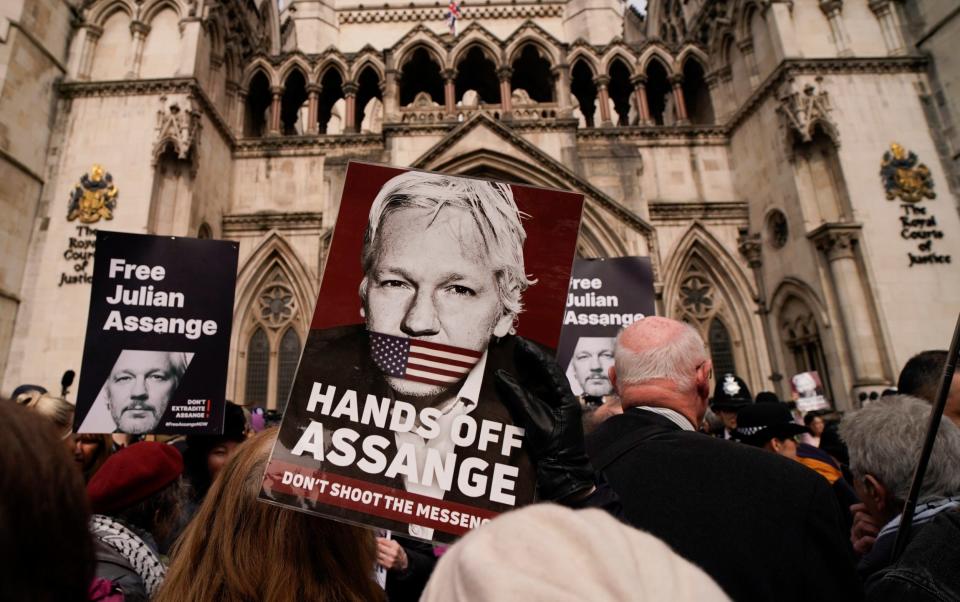

Julian Assange has been released from prison on bail and will return to Australia after reaching a plea deal with the US government over his WikiLeaks disclosures.
Papers filed in the US District Court for the Northern Mariana Islands, an American territory in the Pacific Ocean, on Monday revealed Mr Assange will plead guilty to one felony charge in exchange for his immediate freedom.
The US Justice Department has agreed to drop 18 espionage charges against him – instead charging him only with conspiracy to obtain and disclose national defence information.
Under the terms of the deal, the journalist will be sentenced to 62 months in prison, but the five years he has already spent incarcerated in HMP Belmarsh in the UK will count against that period. The agreement must be approved by a federal judge before it can take effect.
Mr Assange left Belmarsh on Monday morning and boarded a flight at Stansted Airport to leave the UK, WikiLeaks said.
A video posted on X by WikiLeaks showed Mr Assange dressed in a blue shirt and jeans, signing a document before boarding a private jet.
Mr Assange is scheduled to appear in a US federal court on Wednesday at 9am local time (Tuesday 11pm, GMT) in Saipan, the capital of the US-controlled Northern Mariana Islands. The case is being heard outside of the continental United States because of Mr Assange’s opposition to travelling there.
He will return to Australia after the hearing, the Wikileaks statement added.
“This is the result of a global campaign that spanned grass-roots organisers, press freedom campaigners, legislators and leaders from across the political spectrum, all the way to the United Nations,” the group said.
“This created the space for a long period of negotiations with the US Department of Justice, leading to a deal that has not yet been formally finalised.”
It added: “As he returns to Australia, we thank all who stood by us, fought for us, and remained utterly committed in the fight for his freedom.”
Deal to end lengthy stand-off
The decision to allow Mr Assange to leave jail without facing spying charges in the US follows years of wrangling between at least four countries over his case.
In 2018, the US brought 18 charges against Mr Assange, 52, over the online release of hundreds of thousands of classified military documents from 2009 onwards.
The journalist and campaigner was accused of working with Chelsea Manning, a former US Army soldier, to obtain and release papers relating to the wars in Iraq and Afghanistan, in what has been dubbed the largest leak of sensitive material in American history.
The WikiLeaks website later released more documents from the Democratic National Committee and from the CIA.

American officials argued that his actions endangered national security and the lives of US personnel working overseas, but press freedom campaigners said the WikiLeaks documents had exposed US government wrongdoing and that he should be released.
The US charges, which were brought against Mr Assange under Donald Trump’s presidency, could have resulted in a custodial sentence of 175 years.
However, the case was complicated by the fact that Mr Assange lived at the Ecuadorian embassy in London, with political asylum status, for seven years from 2012 to 2019.
The Ecuadorian government refused British police access to Mr Assange, arguing that any officer who entered the building to arrest him would be in breach of the Vienna Convention on diplomacy.
The relationship between Mr Assange and the embassy eventually broke down, and he left in April 2019 to be arrested by British police on charges of breaching his bail conditions from an earlier case in Sweden, and on behalf of the US authorities.
He was sent to HMP Belmarsh, in southeast London, where his planned extradition was further delayed by a series of legal challenges.
Mr Assange’s legal team brought a variety of appeals against the extradition order, including that would likely face the death penalty if convicted in the US, in what he argued would amount to a breach of his human rights.
In April, Joe Biden’s administration provided “binding assurances” to the UK government that Mr Assange would not face the death penalty if he stood trial.
However, the US Justice Department has soured on the idea of bringing espionage charges against Mr Assange in recent months.
Both Anthony Albanese, the Australian prime minister, and the Australian parliament have urged Mr Biden to construct a plea deal that would allow Mr Assange to return home. The US president said earlier this year that he was “considering” that deal.
Last month, Mr Assange fought off the threat of an immediate extradition to the US while his lawyers worked on an agreement with the American authorities.
Mr Assange has been married to Stella Assange, a former lawyer on his case, since 2015. In 2021, he had a small stroke while in prison.
EMEA Tribune is not involved in this news article, it is taken from our partners and or from the News Agencies. Copyright and Credit go to the News Agencies, email news@emeatribune.com Follow our WhatsApp verified Channel









